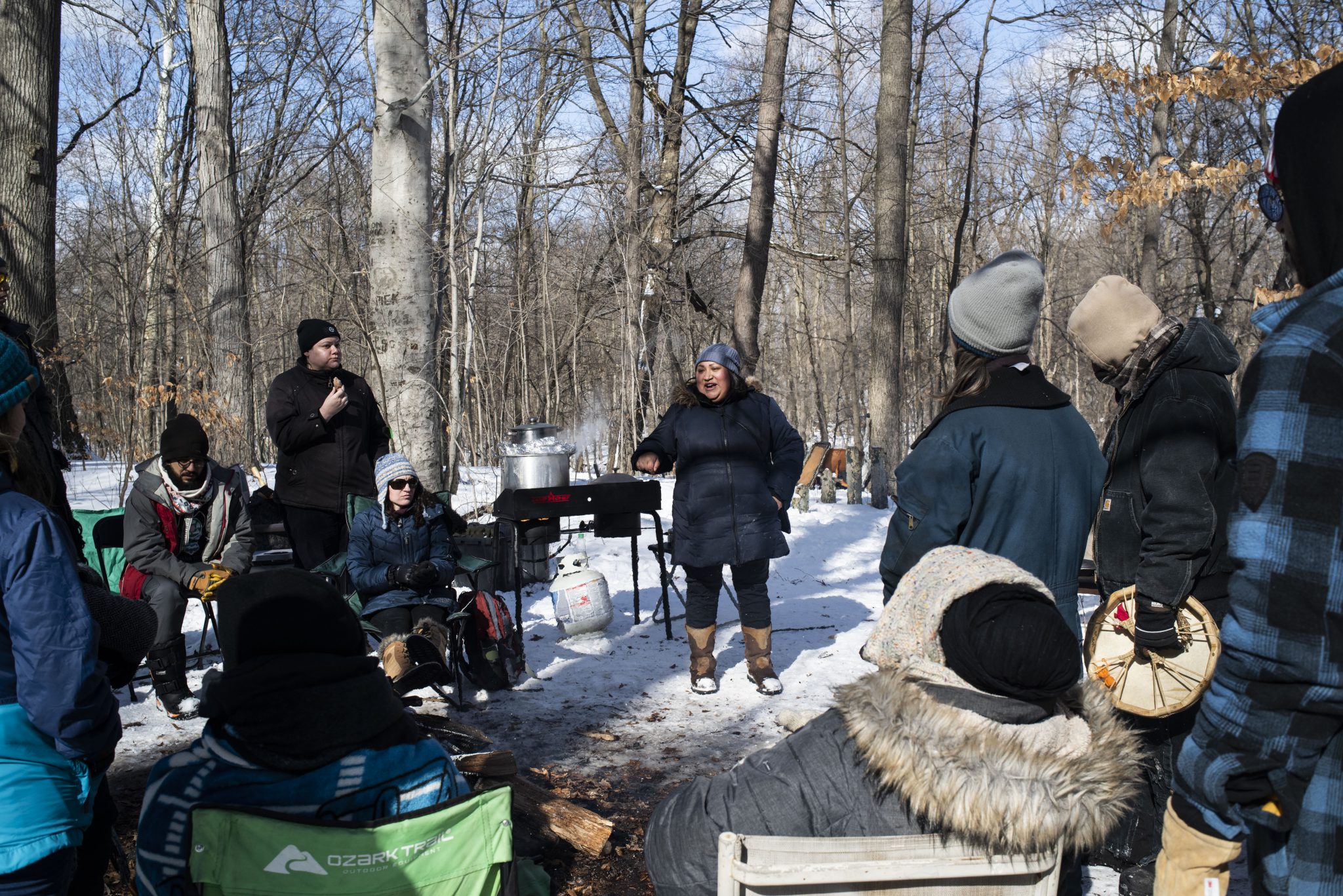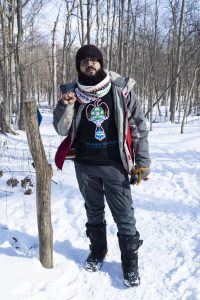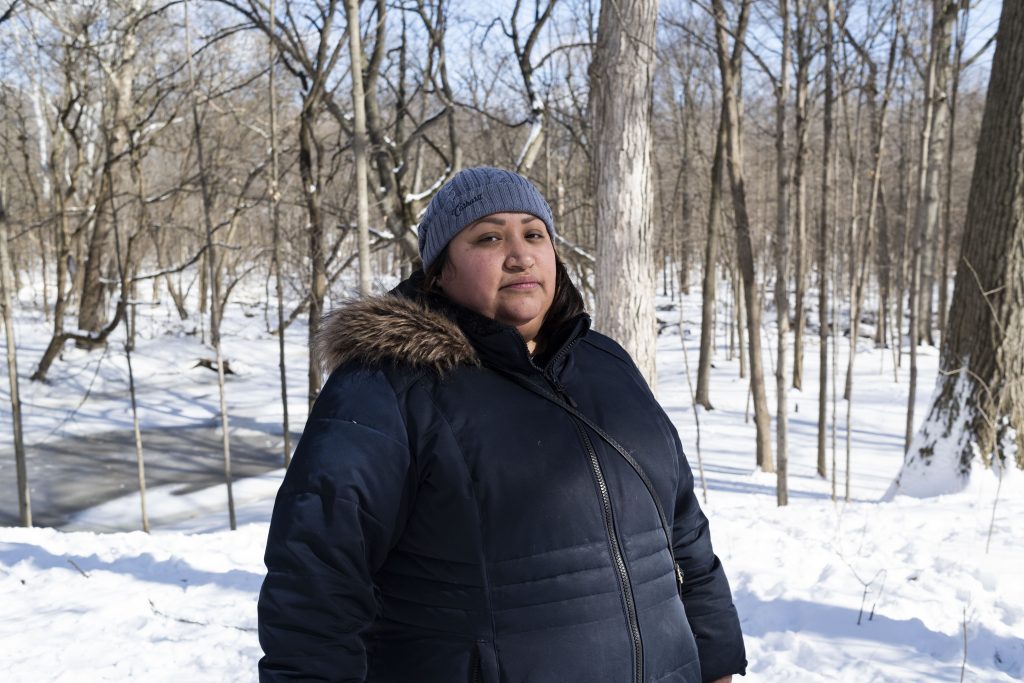“A beautiful process”: Work continues for Detroit Sugarbush Project
An indigenous ceremony to kick off maple syrup season was shut down. Accounts of what happened that night in Rouge Park differ, but there’s still work to be done to tap trees for the sweet sap.

Rosebud Bear Schneider speaks to the people who have gathered for an indigenous ceremony marking the start of the maple sap harvest. Photo by Rosa María Zamarrón
The sugar maples are running in Rouge Park, and a local group is out tapping trees for the sweet sap.
“It’s been a beautiful process. It’s our third year doing this in Detroit,” says Antonio Cosme, who is the senior coordinator for education at the National Wildlife Federation and one of the organizers of the Detroit Sugarbush Project.

Cosme is on his way to clean out a 250-gallon tote. That’s a big tote, but it’s because it takes about 40 gallons of sap to make one gallon of maple syrup.
“It’s a lot of work. It takes a whole team to accomplish this out here,” says David Pitawanakwat, a law student at the University of Detroit-Mercy who leads the Native Law Society at the University of Windsor. He helps with the sugarbush project too.
The team includes area kids.
“But when you bring these youth out here, you show them where food comes from, you show them how to respect the environment and how to produce it sustainably, then that pays dividends in the future,” says Pitawanakwat.
To open the gathering of sap, an indigenous ceremony was held last Friday in Rouge Park that included a bonfire and a welcome song. The fire is the heart of the community, bringing together people around the campfire to talk with each other.
“When we get tobacco to the fire it burns and it produces smoke,” says Pitawanakwat. “Tobacco is our most sacred medicine because the smoke rises … and that smoke carries our prayers to the eagle who carries our prayers to the Creator.”
Last Friday, those prayers were disturbed by police.
A patrolling Michigan State Police helicopter saw a fire in the park. Detroit Police were notified. The Detroit Fire Department was not. About a dozen officers showed up.
Rosebud Bear Schneider is an Anishinaabe farmer, food sovereignty advocate and a citizen of the Lac Courte Oreilles band of Lake Superior Chippewas. The incident with the police really bothered her, Schneider says.
“We were in ceremony, we were still praying, we were still there, there were things that we couldn’t finish doing to close up that ceremony. So, when natives are out in nature, on land that we’re allowed to be on practicing our culture, legally, why is that okay [for the police to break up the ceremony]? Make it make sense, you know?” Schneider says.
Pitawanakwat was disappointed by the officer’s demeanor.
“They’re very disrespectful. Threatened us with arrest and it’s deflating. It’s disheartening,” Pitawanakwat says.
Listen: Work continues for Detroit Sugarbush Project.
Detroiter Hadassah GreenSky is a member of the Little Traverse Bay Bands of Odawa Indians who recorded her interaction with officers. When told they had a federal tribal ID, one of the officers was recorded as saying “That sovereign stuff is not valid.”
In a statement, Detroit Police Chief James White says officers shut things down because the proper city bureaucracy was not followed like insurance and a burn permit. That’s something that Cosme disputes.
Detroit Fire Commissioner Dave Fornell told WDET the process for a burn permit was started but not completed.
Pitawanakwat says the situation is unfortunate for many reasons.
“It just doesn’t look good for the city and now you’ve got a whole host of indigenous people that were out there with us, including children by the way, that we just don’t have any reason to trust the police after this,” Pitawanakwat says.
White told City Council some officers will get extra diversity, equity and inclusion training, but he doesn’t think any of that came into play that night at Rouge Park.

“There was no intent to disrupt this religious ceremony at all,” White says. “The officers were not influenced by race, culture or anything like that. They were simply investigating a fire in the park.”
For Schneider this is a reminder of the hurdles indigenous people face.
“And I think that is one of the big things that has sparked this fire for us, protecting our land, our land rights and our water rights and really trying to repair the damage that’s been done and fight for these future generations,” Schneider says.
Cosme says — for now — he’s not concerned with a broader fight against potential civil rights violations. He’s too busy.
“I’m just focused on getting the sugarbush together,” Cosme says.
David Pitawanakwat says he’s just going to keep on keepin’ on.
“You know we’re just out here having our ceremonies, livin’ life, tapping these trees and just generally trying to bring something good to the city,” Pitawanakwat says.
For one night at least that “good” was disrupted. In the sugarbush, the maple sap still flows.
Editor’s Note: Southwest Detroit-based documentary photographer Rosa María Zamarrón contributed to this report.
Trusted, accurate, up-to-date.
WDET strives to make our journalism accessible to everyone. As a public media institution, we maintain our journalistic integrity through independent support from readers like you. If you value WDET as your source of news, music and conversation, please make a gift today.
